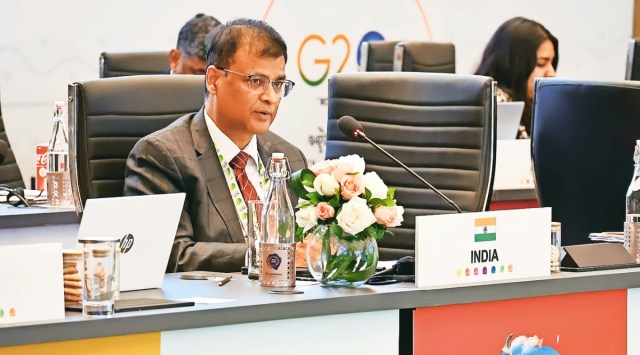1993-batch IRS officer Rahul Navin appointed ED Acting Director
Initially, Mishra was appointed to the post for two years by an order dated November 19, 2018. On November 13, 2020, the Centre extended his tenure by a year.
 The Centre had approached the Supreme Court seeking a tenure extension for Mishra till October 15. Before this, the Supreme Court had declared the two tenure extensions granted to Mishra beyond September 8, 2021 as “not valid in law”.
The Centre had approached the Supreme Court seeking a tenure extension for Mishra till October 15. Before this, the Supreme Court had declared the two tenure extensions granted to Mishra beyond September 8, 2021 as “not valid in law”.
President Droupadi Murmu on Friday appointed an Indian Revenue Service (IRS) officer of the 1993 batch, Rahul Navin, as the Acting Director of Enforcement Directorate. He is currently working as Special Director-Chief Vigilance Officer (ED headquarters).
In an order, issued on Friday, Joint Secretary (Ministry of Finance) Ritvik Pandey said, “The President is pleased to order the cessation of tenure of Sanjay Kumar Mishra, IRS-84 batch as Director of Enforcement in the Enforcement Directorate and placing Rahul Navin, Special Director (ED) as in-charge Director-ED till appointment of a regular Director or until further orders, whichever is earlier.”
In July, the Supreme Court allowed Mishra to continue as the Director-ED till September 15, instead of the earlier July 31 deadline. A bench of Justices B R Gavai, Vikram Nath and Sanjay Karol said it was granting the extension in “larger public and national interest” but that Mishra would cease to remain ED chief from the midnight of September 15.
The Centre had approached the Supreme Court seeking a tenure extension for Mishra till October 15. Before this, the Supreme Court had declared the two tenure extensions granted to Mishra beyond September 8, 2021 as “not valid in law”.
Initially, Mishra was appointed to the post for two years by an order dated November 19, 2018. On November 13, 2020, the Centre extended his tenure by a year. This led the NGO Common Cause to file a PIL seeking that the November 13, 2020 order be set aside since Mishra’s overall tenure of three years violated Section 25 of the Central Vigilance Commission Act.
In November 2021, with the one-year extension to Mishra coming to an end, then President Ram Nath Kovind signed ordinances that amended the laws governing the CBI and ED, enabling the government to keep the two chiefs in their posts for one year after the completion of their two-year terms and to keep giving these one-year extensions until they complete five years as chiefs.
However, in May this year, Justice Gavai said he was of the prima facie view that the 2021 case had not been rightly decided, and required reconsideration. He said the case did not involve a question of extension then. Thus, the question resurfaced before the court before it culminated in the July 11 ruling.







